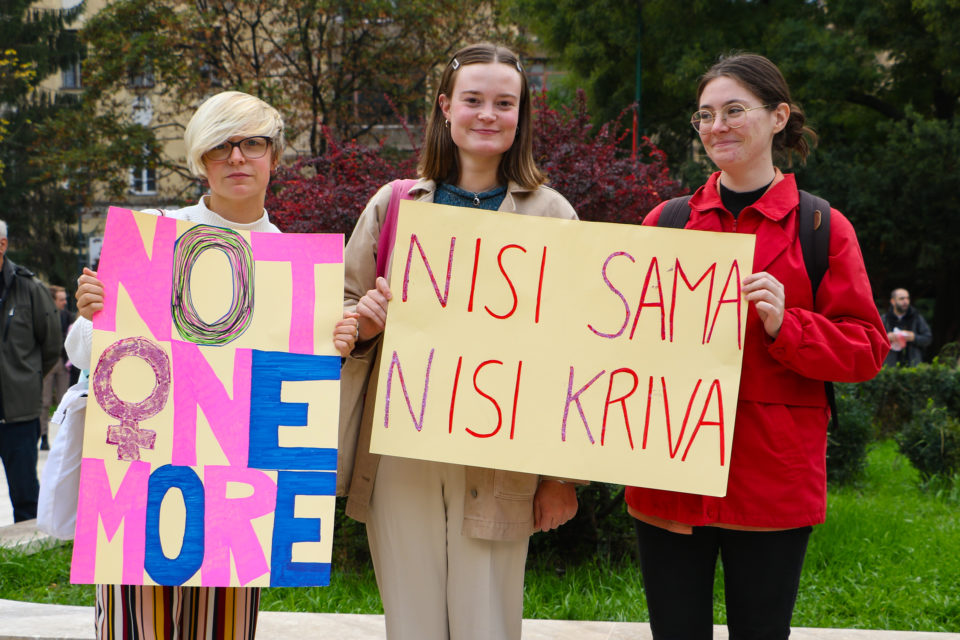
Violence against women in Bosnia and Herzegovina (BiH) is widespread, but often goes unnoticed until the final iteration – murder.
Although there are legal measures in place to deter and punish violence against women, experts warn that these are not adequate, a fact to which recent murders attest. In addition, femicide still lacks a universally agreed upon definition, as well as recognition as a distinct criminal offense under BiH law.
Support services for victims of violence are largely gender-insensitive and thus fail to meet the specific needs of women who are physically and/or sexually abused. Furthermore, courtroom statistics show that male perpetrators of violence against women are often given conditional or inordinately low prison sentences, and that enforcing female victims’ right to compensation for damages and costs incurred as a result of violence is still the exception rather than the rule.
Experts and human rights activists agree that recognizing femicide as a legal category would facilitate the prosecution of perpetrators, however a number of additional steps are necessary to put an end to the murder of women in BiH. These measures include harmonizing the relevant legislation among the country’s sub-state administrative units, educating the general public, adequately assessing and risk factors and implementing a timely response, and mobilizing the political will of competent authorities.
Male Perpetrators, Female Victims
According to OSCE research from 2018, every other woman over the age of 14 in BiH has experienced or been threatened by some form of violence, rather physical, sexual, or psychological.

As of November 13th, 2022, the Sarajevo-based CURE foundation recorded 11 cases of murder that year which qualify as femicide. Medina Mujić from the CURE Foundation emphasizes the importance of having accurate data on instances of violence, as patterns of violence against women often end in murder. Additionally, she highlights the need for the law to be applied consistently in all cases of femicide, which in BiH, are most commonly committed in the context of domestic violence. These measures must be in place before perpetrators of femicide can reasonably be expected to be held to account according to the full measure of the law.
“The Analysis of the Practice of Courts in the Processing of Femicide and Attempted Femicide in Bosnia and Herzegovina,” published by the AIRE [Advice on Individual Rights in Europe] Center, examines criminal proceedings in BiH from the beginning of 2017 to the end of June 2021. This research shows that in all murder cases involving a female victim, the perpetrator was male. For these crimes – which are variously classified as homicide, aggravated homicide, attempted homicide, attempted aggravated homicide, or domestic violence resulting in death – the minimum sentence is one year. Of the cases covered in the AIRE Center analysis, 31 perpetrators were sentenced to prison, including three life-time sentences.
Amila Ždralović, Associate Professor at the University of Sarajevo Law School, defines femicide as “the murder of a female which is motivated by a hatred of women.” She pointed out that femicide should be interpreted in the context of the socio-cultural context and patriarchally defined gender roles and norms.
Similarly, Nataša Jovanović, a psychologist and practitioner of transactional analysis, explained why femicide should be distinguished from other types of murder.
“It’s important to distinguish femicide from other types of crime because it’s a crime committed against women simply for being women. The difference between femicide and other types of crime is in the motive to commit femicide itself, which comes from the perpetrator’s feelings of anger, hatred, jealousy, and ownership towards women, as well as their search for pleasure and power,” Jovanović said.
According to Aleksandra Petrić from the Banja Luka United Women’s Foundation, existing legislation in the country’s three sub-state administrative units – the Republika Srpska, the Federation of BiH, and the Brčko District – needs to be harmonized, as well as brought into compliance with the Istanbul Convention, that is, the Council of Europe Convention on Preventing and Combating Violence Against Women and Domestic Violence. Achieving this, Petrić says, will require the cooperation of various government institutions.
“Most laws and public policies are gender neutral. They don’t recognize the gender dimension of discrimination and violence faced by women and girls,” Petrić explained.
“Violence Knows No Bounds”
The available research suggests that the causes of femicide lie in the status of women and the gender roles governing patriarchal societies like BiH, where there is a widespread belief that women should be subordinate to men. In such contexts, violence against women by partners, acquaintances, and even strangers is commonplace.

“Society often blames the victims for their passivity or bad choices of partners, even going so far as to blame the abuse or murder of women on the victims’ behavior,” said Petrić. She added that these attitudes are heavily influenced by the media, which often represents murders of women as a family tragedy, or the perpetrator of the crime as a calm, caring, and exemplary man.
Mujić believes that “femicide is the result of culminating violence,” and violence, she says, “knows no bounds.”
According to the “The Analysis of the Practice of Courts in the Processing of Femicide and Attempts of Femicide in Bosnia and Herzegovina (2017-2021),” a perpetrator’s likelihood of committing femicide can also be assessed based on their previous behaviour. The analysis states:
“Perpetrators have usually been convicted of various crimes, most often property crimes (theft, aggravated theft, robbery) as well as violent offenses resulting in minor to severe physical injuries, violent behavior, endangerment, obstruction of official duties, and illegal production and distribution of narcotic drugs.”
Moreover, Petrić notes that when a perpetrator is not sufficiently punished for his offenses, his violent behavior often escalates because “he feels that no one can stop him.”
“There are very common reasons why cases of violence against women end in femicide, including the system’s inadequate response towards protecting victims of violence, the absence of strong measures against perpetrators of violence, and the absence of detailed assessment of the risk that violence could intensify and end in femicide,” explained Petrić.
She believes that above all, it is important to implement stricter punishments for crimes of violence against women and to ensure that judges and prosecutors are educated about femicide and adequately trained to deal with such cases. Petrić also stresses the need to improve security and support mechanisms within the judicial system for female survivors of violence who testify against their assailants in court, as well as for law enforcement to take preventative measures by implementing and responding to risk assessments.
“The police need to consistently carry out risk assessments in all reported cases of violence against women and to recognize situations or indicators that violence will be repeated or escalate,” said Petrić. She added that threats, aggressive behavior, and weapon ownership are some of the factors that suggest a perpetrator may intend to repeat acts of violence.
Education as the Key in Combatting Violence Against Women
Jovanović identified educating children and young people about the first signs of violence as an important way to help them protect themselves. Additionally, she said they should be taught about harmful societal stereotypes and assumptions about gender. “Students should also be educated about gender equality and gender-based violence, so we have adequate professionals in the victim protection system,” Jovanović pointed out.
Professional education and training in accordance with international standards is likewise essential for those involved at every stage of processing these cases, from reporting and victim protection to prosecution.
“Carrying out mandatory training of all professionals who work with victims and perpetrators of violence and tightening the criminal policy for acts of gender-based violence must be a priority in institutions throughout Bosnia and Herzegovina, which unfortunately is not the case now,” said Petrić.
Jovanović shares this opinion, emphasizing that additional training is needed for professionals who work with female victims of violence.
“As oppression grows, so does resistance. There are activists, feminists, and defenders of women’s rights working 24 hours a day, who refuse to accept gender injustice. In communities around the world, people are calling for change and pressuring governments to take immediate action. We can see that thousands of them, from Iran to the Western Balkans, are taking to the streets demanding justice for women,” Mujić pointed out, adding that “across the Balkans we still see oppressive governments functioning in such a way that women who experience violence are continuously victimized and have no adequate resources or support.”
According to Mujić, it is high time to adopt evidence-based policy measures to protect women and girls, as well as to implement educational reforms that strengthen gender equality.
“It is time to stop violence against women,” said Mujić.
Saša Magazinović, a member of the House of Representatives of the Parliamentary Assembly of Bosnia and Herzegovina representing the Social Democratic Party, said that he will work on defining femicide as a criminal offense in the new mandate.
“Defining femicide as a special criminal offense with special punishments will be the first legal project that I will undertake in the new mandate, together with organizations for the protection of women’s rights,” said Magazinović, noting that to date, the government has ignored issues and initiatives related to femicide.
Recognizing femicide as a legal category would not only facilitate its prosecution but would also contribute to the reduction of female murder victims in the country. However, in order for femicide to be eliminated completely, a number of other measures need to be taken, including harmonizing relevant laws throughout BiH, training professionals who encounter domestic violence from the reporting stage to its prosecution, and educating young people and the general public.






